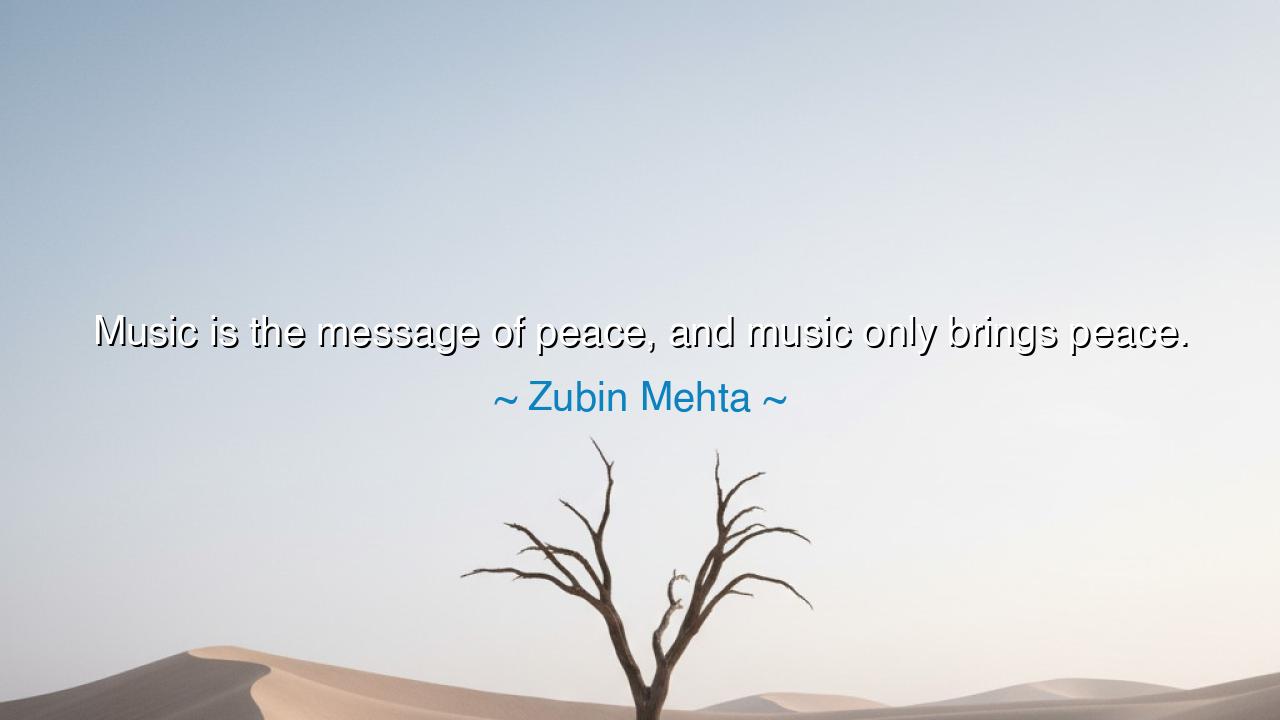
Music is the message of peace, and music only brings peace.






Hear the timeless words of Zubin Mehta, master of the orchestra and servant of the universal spirit: “Music is the message of peace, and music only brings peace.” In these words, there is no hesitation, no shadow of doubt. For music is not merely sound shaped into beauty; it is the language of harmony itself, the one voice that transcends borders, religions, and divisions. When music rises, swords are lowered, hearts are softened, and the human soul remembers its longing for unity.
To say that music is the message of peace is to recognize its divine origin. Unlike words, which may divide, or politics, which often inflames, music bypasses the battleground of argument and speaks directly to the heart. A melody does not ask the listener which nation he belongs to, which creed he follows, or which language he speaks—it simply enters, and with it comes peace. This is why lullabies soothe infants who do not yet understand speech, and why choirs of strangers can join as one, though they share nothing but a song.
History bears witness to this truth. In 1989, when the Berlin Wall fell, it was not only the hammers of workers or the cries of citizens that marked the moment—it was the music of Beethoven’s Ode to Joy, conducted by Leonard Bernstein, that rang out in celebration. Germans from East and West, once divided by iron and barbed wire, wept together as they heard the same notes resound. Politics had failed them for decades, but music reminded them of their shared humanity. Truly, music had brought peace.
Even in times of war, music has been the secret ambassador. The Christmas Truce of 1914 saw soldiers of opposing armies pause their battle as carols drifted across the trenches. Men who had been enemies hours earlier joined in singing the same hymn, their voices mingling in the frozen night. For a brief, shining moment, music achieved what diplomacy could not: it dissolved hatred and replaced it with brotherhood. This is the power of music’s message of peace—to remind us that we are one family, and that division is a wound upon our shared spirit.
Zubin Mehta himself lived this truth through his baton. Conducting orchestras from nations often divided by conflict, he showed that the universal language of music could bring together Israelis and Palestinians, Indians and Pakistanis, Europeans and Americans. Under his leadership, notes became bridges, harmonies became treaties, and the very act of playing together became a model for peace. An orchestra, after all, is itself a living symbol of unity—many instruments, each different, each vital, blending into one voice.
The lesson of this quote is clear and radiant: if you would be a bearer of peace, let music guide your spirit. Do not underestimate the quiet power of a song sung with sincerity, of an instrument played with love, of a chorus that rises in unison. Music has no weapons but beauty, and yet with beauty it conquers anger, with harmony it overcomes strife. The soul that fills itself with music cannot easily harbor hatred, for peace flows naturally from its notes.
Practical action lies before you: fill your home with music that uplifts and unites. Share songs with others, not only those of your own culture, but those of distant lands, so that your heart may learn kinship with all humanity. Support gatherings, concerts, and choirs, for every voice raised together is an act of peace. And if you can create, then create music not for vanity but for harmony, that your song may be a balm to others.
And so, remember Zubin Mehta’s words: music only brings peace. It does not incite, it does not destroy—it heals, it gathers, it unites. To embrace music is to embrace peace, and to share music is to sow peace in the hearts of others. Let your life, then, be like a symphony, each act a note of compassion, each word a chord of harmony, until the whole of your being sings the eternal message of peace.






AAdministratorAdministrator
Welcome, honored guests. Please leave a comment, we will respond soon